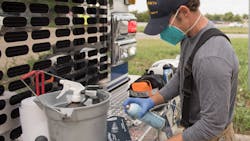Coming out of 2020 continues to be a challenge for everyone, particularly those of us who are in public safety. Everyone is tired of living, breathing, sleeping and hearing about COVID-19.
Do you know what I’m tired of hearing? Public safety professionals throwing around the phrases “the new norm” and “this is how it’s going to be from now on.” Think about this for a minute: Is it really a new norm? Is what we are doing—in public safety, mind you—really all that new?
The precautions that we now are supposed to take are nothing new. In fact, I can remember as a child, my mother and schoolteacher taught me to wash my hands and cover my mouth when I sneezed or coughed. When I went to EMT school, the instructors taught me to wear gloves, wear eye protection, and even wear a mask and gown when the situation presented the possibility of contamination. (You remember that little thing we always referred to as BSI—Body Substance Isolation?)
Even basic CPR classes taught you to take precautions before you helped someone. So, why has this pandemic caused such an outrage in the public safety sector?
Complacency
In my humble opinion, it isn’t about the politics. It isn’t about the society or the left or the right. It isn’t about racial or economic issues. The problem is that we all have become complacent (OK, most of us, so as not to offend those who actually take precautions). Don’t believe me? Let’s take a look at a typical run.
The call is dispatched, and there is a 75 percent chance that it’s a medical call. Depending on how the call was dispatched and how long the members have been on the job, most are likely to pull up to the scene and put on gloves and, maybe, eye protection. Nothing more.
Almost 30 years ago, when I went through EMT school, they warned us about “breathing calls” and that we needed to take precautions and wear masks to prevent the transmission of tuberculosis. Let me say that again: Almost 30 years ago, they told us to wear masks on calls to protect us from a contagious disease. I can promise you, mine wasn’t the only select group in the country that was taught this. Wearing a mask is nothing new!
Getting back to our typical medial call: The patient is examined. The patient might or might not have been tested or might or might not have shown signs of COVID-19. If no signs of COVID-19 are present, we either turn the patient over to transport or we just return to service. However, are we really sure that the individual doesn’t have coronavirus?
Before we return to the station, how many of us actually decontaminate the equipment that was just used? If it isn’t everyone, we have a problem. I was taught that after every call, the BP cuff, the bag, the stethoscope and all of the reusable equipment should be wiped down. The excuse for not doing that always will be that we don’t have time for decontamination, because too many calls are backing up.
The reality is just that: It’s an excuse. All it takes is a few minutes at most to do a quick wipe down of the basic equipment. Look at the decon that occurs after a major trauma call or a full code in the back of a transport unit. They decon the entire back of the unit. It’s complacency, and we are all guilty of it, myself and my staff included.
The point of this article isn’t to bash ourselves or point out the negatives but to simply remind us all, including myself as a chief, that if we just rely on what we were taught, we will get through pretty much anything that we face.
Training always is the key, and I don’t believe that anyone can argue that point. If we train on the basics and create a firm and solid foundation, our jobs and the service that we provide to our community always will be at their best.
Don’t let the shock and awe of something new (or old) dictate a total collapse of your abilities. Remember, we all are trained professionals. Let it be your training, not the scared masses, that guides you.
About the Author
Jeff Stone
Fire Chief
Jeff Stone became fire chief of Morgan County, GA, Fire Rescue in November of 2015 and has 27 years in the fire service. Stone holds numerous educational degrees and both state and national certifications. He received his AAS in fire science from West Georgia Technical College in 2008. He proceeded with his educational advancement with Columbia Southern University with a bachelor’s degree in fire administration in 2012, and a master’s in emergency services management in 2015. Stone then continued with dual master’s from American Military University in emergency & disaster management and homeland security. Stone also holds the designation of Chief Fire Officer through the Center for Public Safety Excellence and is a graduate from the National Fire Academy’s Executive Fire Officer Program. He is a licensed State of GA EMT-I and holds state and national certifications as a Georgia Fire Chief, FF 2, Hazmat Technician, Fire Officer 2, Instructor 3, Inspector 1 and Evaluator. Stone was recently elected to the executive board of the Georgia Association of Fire Chiefs.
